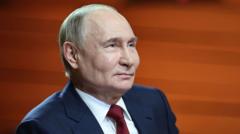As details unfold regarding Andriy Portnov's murder, the implications for Ukraine’s judicial system and political landscape remain uncertain, raising questions about accountability and reform.**
The Aftermath of Andriy Portnov's Murder: A Complex Legacy and Unanswered Questions**

The Aftermath of Andriy Portnov's Murder: A Complex Legacy and Unanswered Questions**
The killing of the controversial Ukrainian figure in Spain has stirred mixed reactions, revealing the intricate web of politics and corruption in Ukraine.**
Andriy Portnov, a controversial figure in Ukrainian politics, was shot dead in a Madrid suburb shortly after dropping his children off at school. The news of his murder shocked many, but it did not result in widespread mourning within Ukraine, where he was notorious for alleged ties to corruption and pro-Russian influence.
Portnov, 51, was gunned down in a parking lot, his death marked not only by the violent manner of his departure but also by the legacy of fear and intimidation he left behind—especially among journalists. His time in power was characterized by aggressive tactics against the press, including threats and lawsuits aimed at silencing dissent.
Ukrainian media outlets have noted how his demise has stirred varied responses, with some commentators pointing to the irony in a man who once called for violence against political adversaries now facing a similar fate. Politicians jumped on the opportunity to voice their thoughts, with Serhiy Vlasenko, a one-time rival, remarking on the necessity of maintaining humanity in discussions of death.
Before his political rise, Portnov had a background in law and initially collaborated with Prime Minister Yulia Tymoshenko. However, his defection to Viktor Yanukovych's pro-Russian camp in 2010 marked a significant betrayal for many, as it aligned him with a regime widely accused of fostering institutional corruption. Critics depict him as the "mastermind" who manipulated the justice system to serve the interests of the Kremlin.
Portnov's legal maneuvering extended beyond Ukraine's borders; he faced sanctions from the United States for allegedly placing loyalists in key judicial positions and controlling judicial outcomes. After fleeing to Russia in 2014 during the upheaval of the Maidan Revolution, he continued to pursue political influence, leveraging connections to pro-Kremlin media in Ukraine.
Speculation regarding his assassination abounds, with some suggesting that it could stem from numerous enemies he accumulated over years of evasion and manipulation. While Ukrainian security services appear wary of connecting the murder to any state-sponsored actions, media reports hint at possible economic motives linked to revenge from the criminal underworld.
Many analysts, including legal expert Mykhailo Zhernakov, caution that Portnov's death does not erase the entrenched corruption he fostered in Ukraine. There is hope that it might stir conversations about the need for judicial reform, but the reality remains that his influence may persist through those he placed in power.
As investigations continue, the implications of his murder and its impact on Ukraine's complex political narrative remain to be seen. With many unanswered questions, the incident serves as a stark reminder of the tumultuous intertwining of justice, revenge, and power within the country.



















